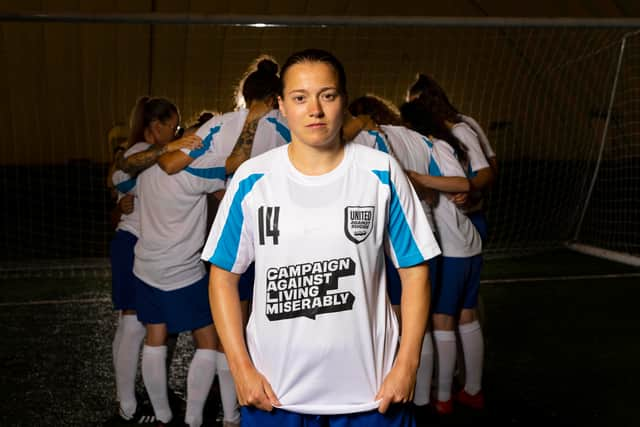A fifth of young women have been called ‘dramatic’ when seeking help for mental health crisis, studies show
Nearly a fifth of young women in the UK aged between 18-34 have felt dismissed or invisible when seeking help for a mental health crisis over the past five years. A study by suicide prevention charity Campaign Against Living Miserably (CALM), has come as part of a new campaign which is aiming to tackle the rising rates of suicide in young women under 25.
According to recent data from the Office of National Statistics (ONS), suicide rates amongst young women under 25 are on the rise, with many women sharing experiences where calls for help went unseen, unheard or dismissed. Recent ONS data revealed that one woman under the age of 25 dies by suicide every two days, meaning that fourteen young women could die throughout this summer’s Women’s World Cup football tournament.
Advertisement
Hide AdAdvertisement
Hide AdEngland Lioness Fran Kirby has teamed up with CALM as part of a new campaign which aims to challenge the stigma and stereotypes that women face when seeking help and getting support. The new campaign will help equip people with practical tools to take action if they see a vulnerable person, which could help save lives.
New YouGov research, commissioned by CALM, suggests that stereotypes around women can lead to those in crisis holding back from speaking up. The data found that of the UK general population of women who have experience a mental health crisis in the past five years, many have avoided discussing it with someone for fear of being seen as “attention seeking” (22%), dramatic or too emotional (33%) or because they thought they wouldn’t be taken seriously (31%).
A shocking 27% of women aged between 18-34 revealed that when speaking up about a mental health crisis, were told it could be down to their hormones, with one in five being asked if they were on their period. A further on in five (20%) of women were told they were being dramatic, with a third being asked if they were “overthinking things”
CALM identified some leading factors on mental health crises in women aged 18-34, including body image (44%), loneliness (39%), relationship issues (32%), money worries (33%) and comparing themselves to others on social media (26%).
Chelsea Forward and England Lioness Fran Kirby has appeared in a short film alongside the mental health charity, which highlights how women can feel invisible when feeling suicidal. Kirby said: "The statistics are hard to digest, as these tragic numbers can be prevented. That’s why I’ve teamed up with CALM to shine a light on this issue, and to tackle the stigma that prevents young women from getting the support they need when they’re struggling. Like any team, we all have our part to play in making sure young women feel seen when they reach out.


Simon Gunning, CALM CEO, said: “More young women are dying by suicide than ever before, with one woman under the age of 25 in the UK taking her own life every two days. These statistics shocking and serve as a stark reminder that we need to do more to protect young people and make suicide prevention a national priority.
“Our research shows that even when they do speak up, young women’s feelings and symptoms are frequently dismissed and ignored - often disregarded as over-emotional, hormonal or attention-seeking. These damaging preconceptions are leaving young women unheard and unsupported and lives are at risk like never before.
“We must take immediate action and strive to overcome the stigma that hinders women from receiving the recognition they deserve during times of crisis. By providing them with the necessary support, we can ensure that no woman has to face her struggles alone.”
Advertisement
Hide AdAdvertisement
Hide AdProf Louis Appleby, a Government adviser on suicide prevention, said: “Suicide in young women is a national priority. Although the rate is not high compared to other groups, there has been a marked rise over the last decade or so. The causes are likely to be complex - including mental ill-health, abuse, online experience - and prevention too has to be wide-ranging. It’s a reminder that suicide is constantly changing, and we must be vigilant.”
Comments
Want to join the conversation? Please or to comment on this article.
